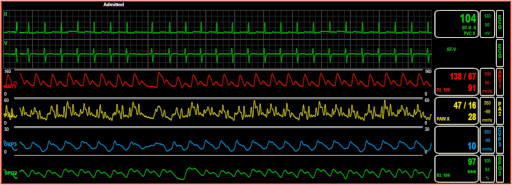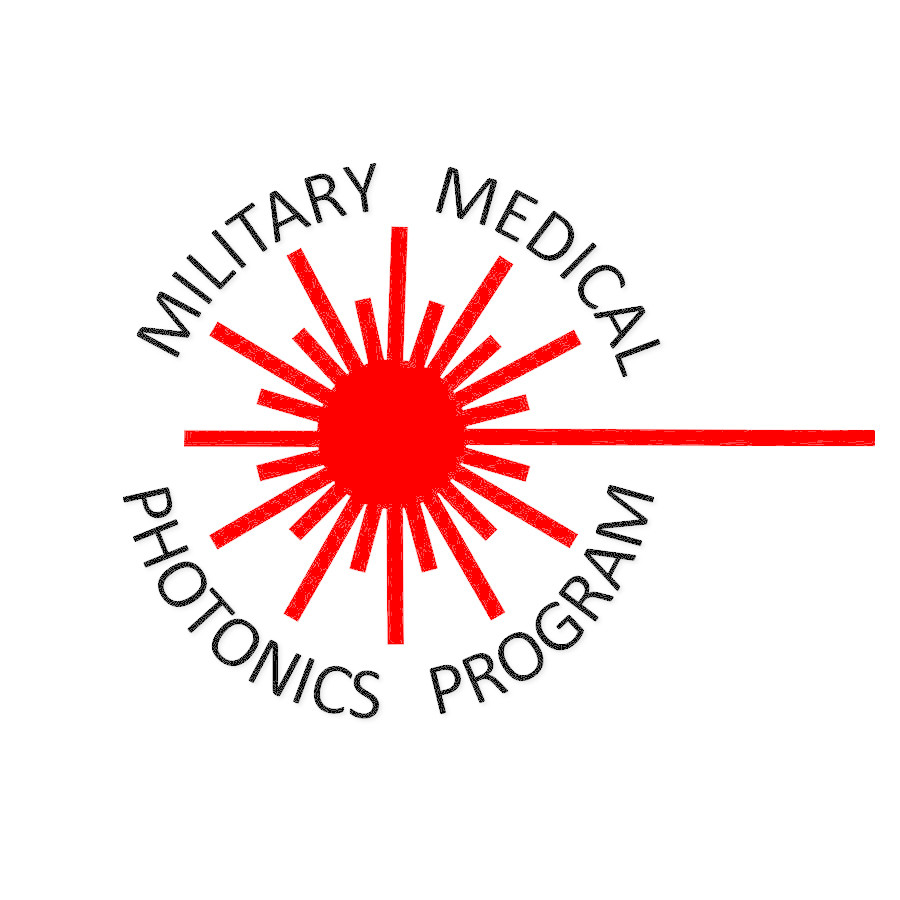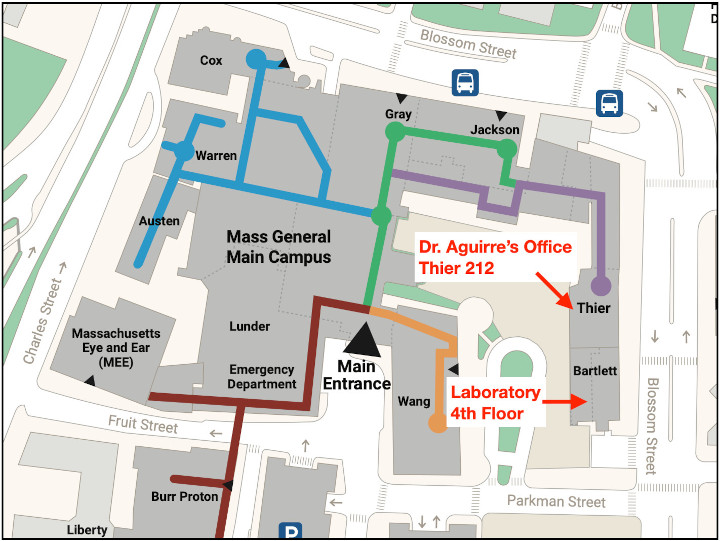Aaron Aguirre, MD, PhD
Read Bio
Dr. Aaron Aguirre is a physician-scientist and an attending critical care cardiologist at the Massachusetts General Hospital and an Assistant Professor of Medicine at Harvard Medical School. He received his M.D. from Harvard Medical School and his Ph.D. in electrical and biomedical engineering from the Massachusetts Institute of Technology, where he worked with Prof. James Fujimoto on high resolution optical coherence tomography methods. He then did residency and fellowship training at the Brigham and Women’s Hospital before completing a postdoctoral research fellowship in cardiovascular imaging at the MGH Center for Systems Biology with Prof. Ralph Weissleder. Dr. Aguirre's laboratory at MGH is now part of the Wellman Center and the Center for Systems Biology and is closely affiliated with the MGH Cardiovascular Research Center. As a critical care cardiologist in the MGH Heart Center Intensive Care Unit, his clinical practice involves care of medical and surgical patients with all forms of advanced heart disease. He has particular interest in the area of acute decompensated heart failure and the use of mechanical circulatory support devices.
Research Themes:
Advanced Cardiovascular Imaging Methods
The laboratory develops new imaging tools for cardiovascular applications, with a focus on optical and ultrasound methods. These include techniques for studying heart function at the single-cell level in mouse models of disease. The team has pioneered intravital microscopy methods utilizing multiphoton microscopy and optical coherence tomography to visualize and measure myoctye and microvascular function. These techniques are powerful for exploring many aspects of cellular physiology in the heart.
In addition, the team is developing optical and ultrasound based methods for coronary imaging and for measuring systemic microcirculatory perfusion in heart failure and circulatory shock. Studies in the laboratory frequently combine fundamental technique development, basic investigation, and translational studies in large animal models and in clinical patients.
Artificial Intelligence in the Intensive Care Unit
The laboratory has multiple projects aimed at integrating artificial intelligence into clinical decision making for hospitalized patients. The team has led the curation of a large collection of inpatient monitoring data including more than 17 million hours of telemetry waveforms from the intensive care units and other clinical wards at the Massachusetts General Hospital. This data can be readily linked with other electronic health record data such as laboratory studies, discrete vital sign and flowsheet information, and imaging records.

The laboratory has a particular interest in the development of new signal processing and machine learning algorithms applied to the high frequency telemetry waveforms. Specific projects focus on clinical needs in the care of patients with acute decompensated heart failure, respiratory failure, circulatory shock, and cardiac arrest. The team collaborates closely with the Biomedical Engineering team at Mass General Brigham in this effort.
Cardiovascular Hemodynamics and Critical Care Physiology
The laboratory utilizes data from the intensive care units to advance understanding of fundamental physiology of cardiovascular disease and critical illness. The group has a particular interest in the hemodynamics of heart failure, shock, and multi-system organ failure and the role of microcirculatory dysfunction in these conditions.

Recent work has led to the development of a new measure for perfusion called tissue perfusion pressure (TPP), which incorporates a fundamental measure of the vasculature called the critical closing pressure (Pcrit). Ongoing studies funded by the National Institutes of Health aim to advance TPP as a guide for treating patients in the intensive care unit.
Military Medicine
The laboratory has a deep interest in developing new technologies that can support the care of wounded soldiers. The group participates in the Military Medical Photonics Program, a longstanding research program funded by the United States Air Force Office of Scientific Research.

Medical Device Development
The group has several projects developing novel device technologies in the areas of critical care medicine, coronary diagnostics, and cardiac surgery. We collaborate closely with clinicians in each of these areas as well as with industry partners when appropriate. We have broad capabilities in design, engineering and device validation including the expertise for large and small animal preclinical work as well as early clinical pilot studies.
Contact Us
The laboratory is located on the MGH Main campus:
40 Blossom Street
Bartlett Building, 4th Floor
Boston, MA 02114
Dr. Aguirre's Office: Thier Building, Room 212

Selected Publications
Li J, Aguirre AD, Moura V, Jin J, Liu C, Zhong L, Sun C, Clifford G, Westover MB, Hong S
An Electrocardiogram Foundation Model Built on over 10 Million Recordings. NEJM AI. 2025;2(7):ePub - PMID: 40771651 - PMCID: PMC12327759 - DOI: 10.1056/aioa2401033Palanques-Tost E, Pallarès-López R, Padrós-Valls R, Song S, Reinertsen E, Churchill TW, Stockwell P, Pomerantsev E, Garasic J, Sundt TM, Shah P, Houstis NE, Aguirre AD
Cardiac Output Estimation in the Intensive Care Unit. JACC Adv. 2025;4(5):101663 - PMID: 40286350 - PMCID: PMC12101535 - DOI: 10.1016/j.jacadv.2025.101663Foy BH, Carlson JCT, Aguirre AD, Higgins JM
Platelet-white cell ratio is more strongly associated with mortality than other common risk ratios derived from complete blood counts. Nat Commun. 2025;16(1):1113 - PMID: 39875373 - PMCID: PMC11775293 - DOI: 10.1038/s41467-025-56251-9Ayers BC, Padrós-Valls R, Brownlee S, Steinhorn BS, Shann K, Osho A, Sundt TM, Aguirre AD
Prebypass Critical Closing Pressure Predicts Acute Kidney Injury After Cardiopulmonary Bypass. J Cardiothorac Vasc Anesth. 2024;39(2):437-446 - PMID: 39645444 - DOI: 10.1053/j.jvca.2024.11.010Chandrasekhar A, Padrós-Valls R, Pallarès-López R, Palanques-Tost E, Houstis N, Sundt TM, Lee HS, Sodini CG, Aguirre AD
Tissue perfusion pressure enables continuous hemodynamic evaluation and risk prediction in the intensive care unit. Nat Med. 2023;29(8):1998-2006 - PMID: 37550417 - DOI: 10.1038/s41591-023-02474-6Foy BH, Sundt TM, Carlson JCT, Aguirre AD, Higgins JM
Human acute inflammatory recovery is defined by co-regulatory dynamics of white blood cell and platelet populations. Nat Commun. 2022;13(1):4705 - PMID: 35995789 - PMCID: PMC9395541 - DOI: 10.1038/s41467-022-32222-2Aguirre AD, Arbab-Zadeh A, Soeda T, Fuster V, Jang IK
Optical Coherence Tomography of Plaque Vulnerability and Rupture: JACC Focus Seminar Part 1/3. J Am Coll Cardiol. 2021;78(12):1257-1265 - PMID: 34531027 - PMCID: PMC9851427 - DOI: 10.1016/j.jacc.2021.06.050Hulsmans M, Clauss S, Xiao L, Aguirre AD, King KR, Hanley A, Hucker WJ, Wülfers EM, Seemann G, Courties G, Iwamoto Y, Sun Y, Savol AJ, Sager HB, Lavine KJ, Fishbein GA, Capen DE, Da Silva N, Miquerol L, Wakimoto H, Seidman CE, Seidman JG, Sadreyev RI, Naxerova K, Mitchell RN, Brown D, Libby P, Weissleder R, Swirski FK, Kohl P, Vinegoni C, Milan DJ, Ellinor PT, Nahrendorf M
Macrophages Facilitate Electrical Conduction in the Heart. Cell. 2017;169(3):510-522.e20 - PMID: 28431249 - PMCID: PMC5474950 - DOI: 10.1016/j.cell.2017.03.050Vinegoni C, Aguirre AD, Lee S, Weissleder R
Imaging the beating heart in the mouse using intravital microscopy techniques. Nat Protoc. 2015;10(11):1802-19 - PMID: 26492138 - PMCID: PMC5380003 - DOI: 10.1038/nprot.2015.119Aguirre AD, Vinegoni C, Sebas M, Weissleder R
Intravital imaging of cardiac function at the single-cell level. Proc Natl Acad Sci U S A. 2014;111(31):11257-62 - PMID: 25053815 - PMCID: PMC4128110 - DOI: 10.1073/pnas.1401316111- More publications ...

